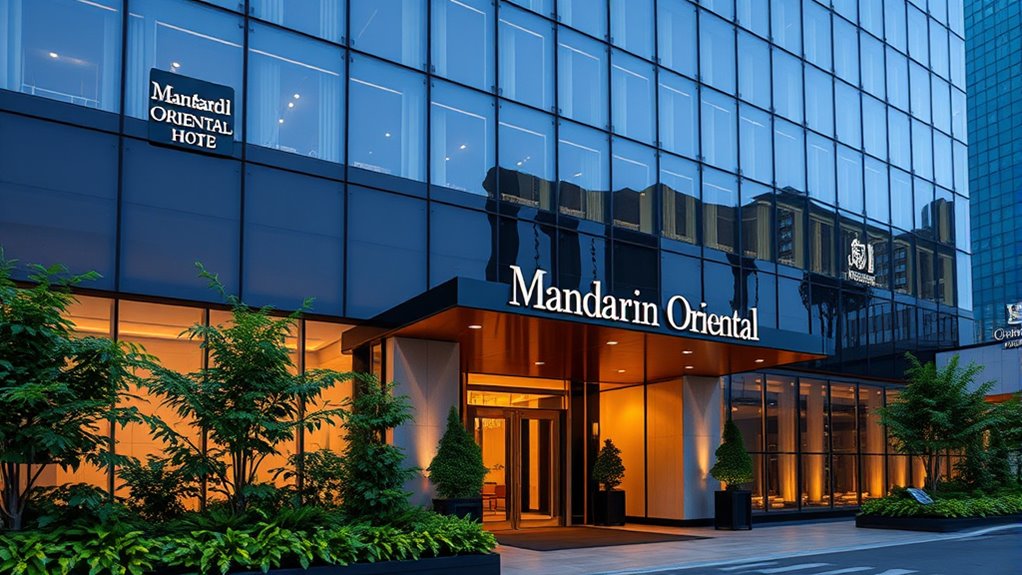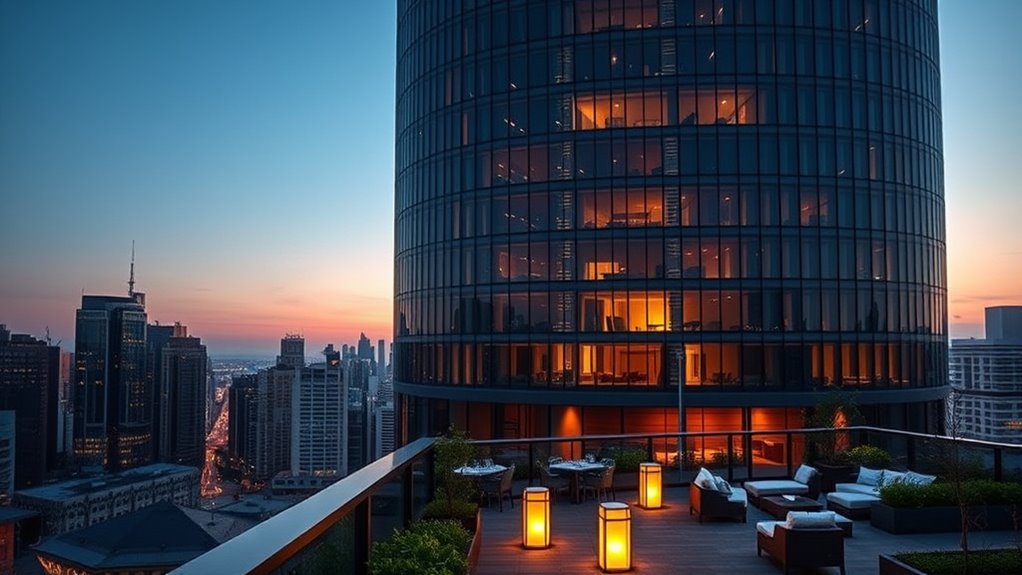Jardine Matheson has taken Mandarin Oriental private in a $4.2 billion deal, acquiring the remaining 11.96% stake at $3.35 per share. This move converts it into a wholly owned subsidiary, giving the company more flexibility to grow and optimize its luxury hotel and real estate portfolio. The deal also includes a parallel sale of assets to Alibaba, boosting liquidity. If you want to understand how this impacts the company’s future strategies, there’s more to explore.
Key Takeaways
- Jardine Matheson, through its subsidiary Bidco, acquires the remaining 11.96% stake in Mandarin Oriental for $3.35 per share, valuing the company at approximately $4.2 billion.
- The deal involves privatizing Mandarin Oriental, delisting it from the Singapore Exchange, and includes a $0.60 special dividend per share.
- The acquisition strengthens Jardine Matheson’s control, enabling long-term strategic growth in luxury hospitality and real estate.
- A parallel sale of the top floors of One Causeway Bay to Alibaba Group generates about $925 million, providing liquidity and strategic flexibility.
- An independent Transaction Committee oversees the process to ensure fairness, given potential conflicts with directors also on Jardine’s board.

Did you know that Mandarin Oriental is now officially taken private by Jardine Matheson? This significant move follows Jardine Matheson, through its subsidiary Bidco, acquiring the remaining 11.96% stake in the hotel group. With the purchase price set at $3.35 per share, the deal values the entire company at roughly $4.2 billion. The offer includes a $2.75 scheme value and a $0.60 special dividend for each share. It’s a substantial premium—52.3% over the closing price of $2.20 on September 29, 2025—aimed at incentivizing minority shareholders to accept the bid.
Mandarin Oriental goes private with a $4.2 billion deal, offering a 52.3% premium to shareholders.
As a shareholder or observer, you should recognize that this acquisition consolidates Jardine Matheson’s control over Mandarin Oriental. The Hong Kong-based conglomerate, with a 193-year history spanning property, retail, and automotive sectors, already held a controlling stake before this deal. Now, full ownership will allow Jardine to better support Mandarin Oriental’s growth strategies and streamline its global portfolio. Freed from public market pressures, the company can pursue long-term initiatives more flexibly, balancing luxury hospitality and real estate investment without the constant scrutiny of public investors.
Mandarin Oriental’s portfolio includes 43 hotels worldwide and manages 12 branded residences and 26 luxury homes across 27 countries, including key markets in Hong Kong and New York. Its flagship property, One Causeway Bay in Hong Kong, exemplifies its focus on premium experiences. The brand’s reputation for luxury hospitality and real estate management underpins its global presence. By going private, the company aims to leverage its assets more effectively, optimizing operations and growth opportunities.
Alongside the privatization, a separate but concurrent real estate transaction is taking place. Mandarin Oriental has agreed to sell the top 13 floors of One Causeway Bay, including rooftop signage and parking spaces, to Alibaba Group and Ant Group for approximately $925 million. This sale helps generate significant cash flow while allowing the hotel group to focus on core operations. The transaction is separate but runs parallel to the privatization, providing liquidity and strategic flexibility.
Financially, the deal boosts Mandarin Oriental’s valuation to about $4.2 billion. It also involves delisting from the Singapore Exchange, where shares are traded. The valuation per share, at around $2.18 as of June 2025, was previously below the offer price, making the premium attractive to minority shareholders. The inclusion of a special dividend adds immediate value at closing, further sweetening the offer. The deal also reflects a strategic move to strengthen the company’s focus on core assets and growth avenues.
Governance measures are in place to manage potential conflicts of interest. Several Mandarin Oriental directors also sit on Jardine Matheson’s board, which could raise concerns. To address this, an independent Transaction Committee, composed of non-executive directors, oversees the acquisition, ensuring fair treatment for all shareholders. This step helps maintain compliance with listing rules and preserves trust in the process.

Luxury Hotel Scent Reed Diffuser 100ml (3.38oz) | No.1898 Hotel Collection Diffuser Oil Inspired by Ritz Carlton | Home, Bathroom & Office Decor | Long-Lasting Room Freshener Gift Set
【Immerse in a 5-Star Aroma】: Authentic Luxury Hotel Scent for Home Experience the signature, sophisticated fragrance reminiscent of…
As an affiliate, we earn on qualifying purchases.
As an affiliate, we earn on qualifying purchases.
Frequently Asked Questions
What Prompted the Decision to Take Mandarin Oriental Private?
You’re taking Mandarin Oriental private to streamline ownership, eliminate minority shareholders, and enable faster strategic decisions without public market pressures. This move helps support long-term growth, focus on core operations, and unbolt value in Asia. By simplifying the structure and leveraging recent property sales, you aim to optimize your portfolio, facilitate future investments, and enhance returns, all while maintaining better control over the brand’s development and restructuring efforts.
How Will the Privatization Affect Current Employees and Management?
Privatization could bring more stability to your job, but it might also lead to changes in your role or benefits as the company streamlines operations. Management gains decision-making flexibility, potentially shifting priorities that could impact your daily responsibilities. While some career growth opportunities may align with new strategies, be prepared for possible restructuring or reassignment. Overall, the shift aims to support growth, but it may also introduce uncertainty in your employment.
What Are the Future Expansion Plans Post-Privatization?
Your future expansion plans include opening new properties across Asia, the Americas, and Europe, with a focus on luxury hotels, resorts, and residences. You’ll see developments in cities like Beijing, Chengdu, Miami, and Paris, aiming for a global portfolio of 100 hotels by 2030. Strategic acquisitions and heritage site integrations will support growth, while digital platforms will enhance operations, ensuring your brand continues to expand and innovate worldwide.
How Does This Deal Impact Mandarin Oriental’s Global Brand Strategy?
This deal strengthens Mandarin Oriental’s global brand strategy by allowing you to pursue expansion more freely. With full ownership by Jardine Matheson, you can align your brand more cohesively across markets, enhance your luxury positioning, and explore new opportunities without public market pressures. You’ll benefit from better strategic support, resources, and streamlined decision-making, helping you grow your presence worldwide while maintaining your high standards of service and exclusivity.
What Are the Financial Details Behind the $4.2 Billion Valuation?
You’re probably wondering how they magically arrived at a $4.2 billion price tag. Well, they factored in a hefty 52.3% premium over the previous share price, plus a $0.60 special dividend and scheme value of $2.75 per share. Add in the Hong Kong property sale for $925 million, and you’ve got a deal that’s as juicy as a well-stuffed burger, blending stock value and real estate riches.

CozyLux Queen Comforter Set White Seersucker 7 Pieces Bed in a Bag Queen Comforter Set with Sheets, Luxury Soft Bedding Set with Down Alternative Comforter, Sheets, Pillowcases & Shams for All Seasons
Soft and Ddurable: Whole-piece microfiber fill in the comforter provides exceptional warmth and cozy. The front side just…
As an affiliate, we earn on qualifying purchases.
As an affiliate, we earn on qualifying purchases.
Conclusion
This move to privatize Mandarin Oriental feels like turning a shimmering jewel inward, shielding its brilliance from the public eye. As it slips into private hands, the hotel brand gains a chance to refocus and refine its craft without the glare of the spotlight. While the world watches, you can imagine it as a ship steering into calmer waters, ready to chart a new course. The future of Mandarin Oriental now lies quietly, yet confidently, beneath the surface.

MONARCH Terry Velour Bathrobe – Luxury 100% Cotton Hotel Spa Robe – Plush, Absorbent, Machine Washable – Shawl Collar, One Size
HOTEL GUEST FAVORITE – Indulge in hotel-quality comfort and style with our exclusive Robe. Our hotel robes for…
As an affiliate, we earn on qualifying purchases.
As an affiliate, we earn on qualifying purchases.

Coolife Luggage Set Suitcase Carry On Luggage PC Hardshell Luggage TSA Lock Spinner Wheels Telescopic Handle
Indulge in unparalleled travel flexibility with our chic luggage set. The six-piece set offers a 16’’ luggage, 20’’…
As an affiliate, we earn on qualifying purchases.
As an affiliate, we earn on qualifying purchases.










